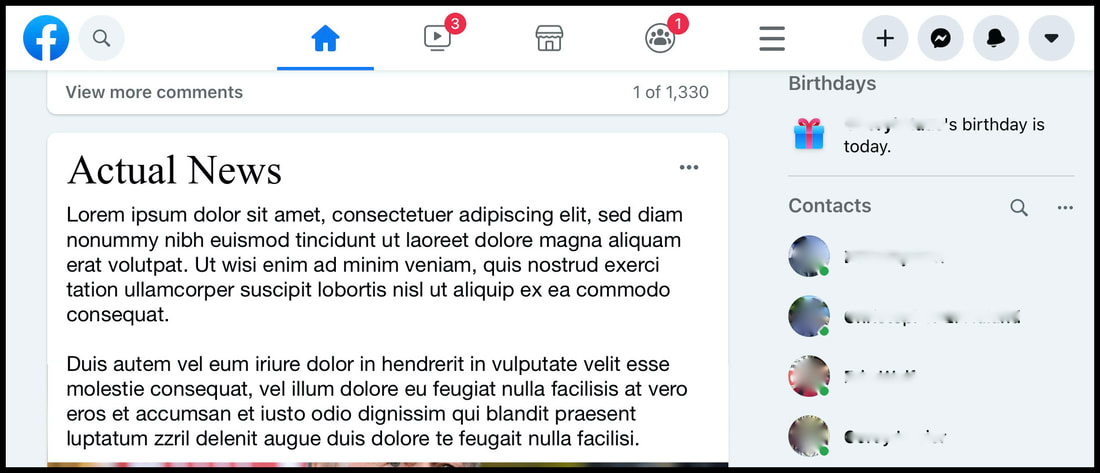|
Imagine an online newspaper with all of the articles removed, where the only thing you can read is the comments. This newspaper already exists. It’s called Facebook. Facebook started in 2004 as a social network focused on connecting individuals, directly with each other — first, students connecting with fellow students, later anyone connecting with friends and family. It would be three years before Facebook gave organizations an online home through Facebook Pages and another three years before Facebook enabled individuals to make indirect connections through Facebook Groups. Today, Facebook is still a place for individuals to connect with people they know, but it’s become, partly organically and partly by design, a place to get news and information. It’s not just social, it’s “media”. As Facebook says in its current mission statement, “People use Facebook… to discover what’s going on in the world”. A look at Facebook’s mission statement over time: 2006: …[to connect] people through social networks at colleges 2008: …to keep up with friends and family, share photos and videos, control privacy online, reconnect with old classmates 2017 to present: …to give people the power to build community and bring the world closer together. People use Facebook to stay connected with friends and family, to discover what’s going on in the world, and to share and express what matters to them. Often, Facebook users also discover a lot of what’s not actually going on in the world. On any social media like Facebook, misleading or just plain false “news”, especially posts that cause outrage, often go viral. Features like Pages and Groups extend the reach of those drumming up outrage over stolen elections, child-trafficking pedophiles, COVID-causing 5G networks, etc. As we’ve recently witnessed, that slanted information can be dangerous, helping incite individual or mass acts of violence.
When issues surface with the content posted by its users, Facebook’s response has been to remove objectionable content, users, and groups. And Facebook has been slow to do that, long accused of hiding behind the liability shield of Section 230 of the Communications Decency Act, at least until the riotous aftermath of the 2020 election forced their hand. In addition to sowing controversy, moderating objectionable users and user behavior is inherently limited. It only filters out objectionable discourse — it does not put that discourse in context or introduce countervailing facts. Facebook should acknowledge that “discovering what’s going on in the world” has become a large enough part of its use, and abuse, to give actual news a home on its platform. By actual news, I mean news written by authors who:
Fortunately for Facebook, there are abundant news sources available that meet these standards. They’re called newspapers, almost all of which are available in digital form. The list of best practices above is excerpted from the code of ethics of the Society of Professional Journalists, which helps set journalistic standards in the US. (Most newspapers publish a combination of news, analysis, and opinion. I have nothing against analysis and opinion pieces (including the one I’ve written here), but in the context of this article I am talking specifically about just-the-facts news.) Ironically, Facebook calls its main source of user information a News Feed. The News Feed contains user posts, updates from Pages, and (lots of) ads. Facebook’s News Feed doesn’t contain any actual news — but it should. Facebook has the technical and financial means to source news articles from news organizations abiding by SPJ standards, identify articles relevant to content posted by users in News Feeds and Groups, and post those news articles (or their ledes) alongside relevant user-posted content. Facebook wouldn’t have to take responsibility for writing or sourcing news that meets commonly accepted journalistic standards — newspapers already do that. Facebook’s primary responsibility would be to identify those newspapers that don’t. I should mention I am not affiliated with any news organization. But I regard the potentially industry-saving revenue stream for traditional news outlets as a positive byproduct of such an arrangement, not just for the press but for a democracy founded on the principle of a free press. Working with news organizations that abide by journalistic standards, Facebook should publish real news alongside the often false and provocative user posts that are causing so much damage to society. Maybe then Facebook could actually fulfill another part of its mission statement: to “bring the world closer together”. This post is also featured on The Startup.
0 Comments
Your comment will be posted after it is approved.
Leave a Reply. |
AuthorLarry Cynkin is founding principal of GreenBar. Larry's articles have appeared on The Startup (Medium.com's largest publication) as well as CTO Craft and CTO Vision. Archives
February 2021
Categories |


 RSS Feed
RSS Feed